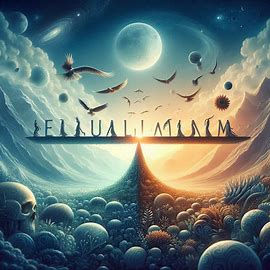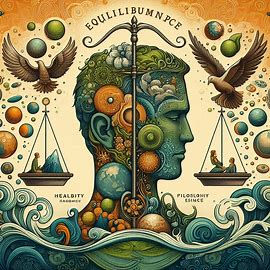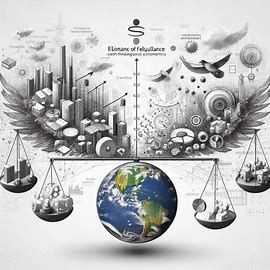Exploring Equilibrium: The Interplay of Science, Philosophy, and Recovery in Human Resilience
- Franco Arteseros
- Jun 17, 2025
- 4 min read

Understanding Equilibrium: The Core of Life
Equilibrium goes beyond balance. It signifies stability, harmony, and a subtle dance of forces that shape everything from natural phenomena to human experiences. The quest for equilibrium is essential in various aspects of life, illustrating the interconnectedness of our experiences. Whether in health, philosophy, or science, balance plays a crucial role.

In this blog post, we will unpack the importance of equilibrium, exploring historical insights, scientific principles, and its vital role in health, especially in recovering from strokes.
One intriguing question lingers throughout: Is finding balance the secret to resilience?
The Foundations of Equilibrium
Ancient Views
The concept of balance has fascinated philosophers for centuries. Aristotle's "Golden Mean" promotes moderation as a path to virtue, asserting that a life balanced between extremes fosters growth and ethical living. For instance, the average person may find that a balanced lifestyle with both work and leisure enhances happiness.

Eastern philosophies also emphasize balance with the yin-yang symbol, representing how opposites coexist. These age-old teachings highlight the ongoing pursuit of equilibrium as a critical aspect of life.
Scientific Insights
Equilibrium is present in numerous scientific fields. In physics, Newton’s laws illustrate how forces interact to maintain stability. In chemistry, dynamic equilibrium accounts for how reactions stabilize in specific conditions.

Biological systems take equilibrium a step further through homeostasis, which regulates bodily functions despite external changes. For example, maintaining a stable internal temperature is crucial for human survival. These varying perspectives reveal that equilibrium is fundamental to understanding the natural world.
Contemporary Views

Today, equilibrium is seen in systems thinking and economics, as balance is crucial for sustainable development. The surge of technology promotes designs that provide seamless user experiences, highlighting the balance between functionality and simplicity.
The evolution of the concept of equilibrium emphasizes its continuing relevance in understanding our world and our lives.
Equilibrium and Human Health: Understanding Balance
The Vestibular System
The human body is an incredible system, with physical balance being one of its marvels. Central to this is the vestibular system, located in the inner ear, which is vital for coordinating movement and spatial orientation.

As we engage in daily tasks—like walking or reaching for something—this intricate system sends vital information to the brain about our position and motion. Understanding this system is crucial in recognizing how balance impacts our health and mobility.

The Effects of Imbalance

For instance, studies indicate that nearly 35% of adults aged 40 and older experience vestibular dysfunction. Such statistics underline the urgent need for effective treatment and recovery strategies aimed at restoring stability and enhancing quality of life.
Pathways to Recovery

Fortunately, therapies exist to help individuals regain their balance, both physically and emotionally. Physiotherapy and occupational therapy focus on retraining the brain and body to improve coordination and resilience. Techniques like balance retraining and sensory integration exercises effectively help individuals regain stability.

Moreover, incorporating mindfulness practices—such as meditation and breathing exercises—not only cultivates physical balance but also supports mental well-being, reinforcing the connection between body and mind in overall health pursuits.
Neuroplasticity After a Stroke: Reestablishing Balance in the Brain
Impact of Stroke on Brain Balance
Suffering a stroke can drastically disrupt the balance within the brain, affecting movement and cognition. This imbalance often creates a series of challenges for both patients and their families.
Understanding these effects highlights the importance of equilibrium—not just physically, but also in how the brain functions. Any disruption can lead to loss of skills that make daily life challenging.
The Brain's Amazing Recovery Power


Despite the severe impact of a stroke, the brain showcases an astonishing ability to adapt, known as neuroplasticity. This process allows neural pathways to form anew, potentially regaining lost functions.
Research shows that targeted therapies can enhance this recovery process. For example, early rehabilitation can lead to up to 70% improvement in physical abilities post-stroke. This adaptability highlights the remarkable resilience of the human brain.
Balance in Rehabilitation Approaches

Innovative rehabilitation therapies focused on restoring equilibrium have gained traction. Techniques such as constraint-induced movement therapy (CIMT) encourage the use of affected limbs, effectively retraining the brain through practice.

Incorporating activities like yoga and tai chi into recovery plans promotes both physical and cognitive benefits. Such holistic approaches align beautifully with the principles of equilibrium, demonstrating their importance in achieving balance in rehabilitation.
Final Thoughts
Throughout this post, we have seen how equilibrium serves as a guiding principle across historical, scientific, and medical avenues. From ancient philosophical teachings to modern recovery practices, it’s evident that balance and stability are integral to our lives.
Whether we’re exploring the vestibular system, the adaptive power of neuroplasticity, or various therapeutic interventions, maintaining equilibrium remains essential for resilience in life.
As we return to the intriguing question posed at the start: Is balance the key to resilience? The evidence suggests that our pursuit of equilibrium is not merely about stability; it is a profound journey toward recovery and wholeness across all aspects of life.
Let us embrace this journey, nurturing balance in our health, experiences, and relationships as we navigate the complexities of our modern world.

Franco Arteseros...




Comments